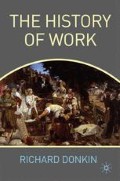Abstract
Throughout the sixteenth century the Bible became the intellectual bread and butter of northern Europe. Translations into the vernacular, spread by the new medium of printing, created a Bible culture that dominated everyday lives. In England Henry VIII complained to Parliament that it was “disputed, rhymed, sung, and jangled in every ale house.”1
All true work is religion.
(Thomas Carlyle, 1795–1881)
Access this chapter
Tax calculation will be finalised at checkout
Purchases are for personal use only
Preview
Unable to display preview. Download preview PDF.
Notes
Everett E. Hagen, On the Theory of Social Change: How Economic Growth Begins, London: Tavistock Publications, 1964, pp. 295–309.
George Unwin, Industrial Organization in the Sixteenth and Seventeenth Centuries, Oxford: Clarendon Press, 1904, pp. 196–227.
David L. Edwards, Christian England, vol. II, Collins, 1983, p. 348.
Copyright information
© 2010 Richard Donkin
About this chapter
Cite this chapter
Donkin, R. (2010). The New Religion of Work. In: The History of Work. Palgrave Macmillan, London. https://doi.org/10.1057/9780230282179_4
Download citation
DOI: https://doi.org/10.1057/9780230282179_4
Publisher Name: Palgrave Macmillan, London
Print ISBN: 978-0-230-23893-0
Online ISBN: 978-0-230-28217-9
eBook Packages: Palgrave Business & Management CollectionBusiness and Management (R0)

